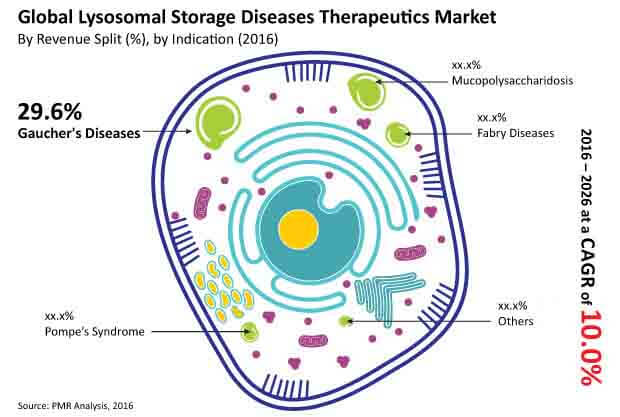Lysosomal Storage Diseases Market Segmented By Gaucher's Diseases, Fabry Diseases, Pompe’s Syndrome, Mucopolysaccharidosis Indication Enzyme Replacement Therapy, Stem Cell Therapy, Substrate Reduction Therapy Therapies
Industry: Healthcare
Published Date: October-2016
Format: PPT*, PDF, EXCEL
Delivery Timelines: Contact Sales
Number of Pages: 167
Report ID: PMRREP3145
Lysosomal storage disorders is a group of genetic metabolic diseases caused by enzyme deficiencies in various body cells. The global lysosomal storage diseases therapeutics market is anticipated to be valued at US$ 14.36 Bn by 2026, registering a CAGR of 10.0% over the forecast period.
An increasing diagnosis rate due to rising awareness and financial incentives for orphan drug development to recover R&D costs is the primary factor fueling the growth of the global lysosomal storage diseases therapeutics market. Other factors driving the global demand for lysosomal storage diseases therapeutics include a faster uptake and faster market access, premium product pricing, and increasing focus of pharmaceutical companies in the research and development of drugs for the treatment of rare diseases.
However, heterogeneity of the disease leading to underdiagnoses of lysosomal storage diseases, lack of treatment options, and high cost of treatment are factors likely to hamper the growth of the global lysosomal storage diseases therapeutics market over the forecast period.
Advent of therapies targeting neuropathic pain management manifestations by crossing blood brain barrier (BBB) and therapies that overcome immune response and have better tissue selectivity will define the future landscape of the global lysosomal storage diseases therapeutics market.
The global lysosomal storage diseases therapeutics market has been segmented on the basis of Indication (Gaucher's Diseases, Fabry Diseases, Pompe’s Syndrome, Mucopolysaccharidosis, Others); Type of Therapy (Enzyme Replacement Therapy, Stem Cell Therapy, Substrate Reduction Therapy, Others); and End User (Hospitals, Clinics).
The Gaucher's Diseases indication segment is expected to be the most dominant segment in global lysosomal storage diseases therapeutics market. This segment is expected to create absolute $ opportunity of US$ 151.7 Mn in 2017 over 2016. The Fabry Diseases indication segment is expected to be the second most lucrative segment with a market attractiveness index of 1.5.
The Enzyme replacement therapy (ERT) segment is estimated to account for 94.7% revenue share of the global lysosomal storage diseases therapeutics market by 2016 end. This segment is expected to continue to lead the global lysosomal storage diseases therapeutics market during the forecast period. The Stem Cell Therapy segment is projected to register a CAGR of 7.1% over the forecast period.
The Hospitals end user segment is anticipated to account for 66.9% revenue share of the global lysosomal storage diseases therapeutics market by 2016 end while the Clinics end user segment accounted for 33.6% revenue share and was valued at US$ 1,714.4 Mn in 2015.

The global lysosomal storage diseases therapeutics market is segmented into the five key regions of North America, Latin America, Europe, Asia Pacific (APAC), and Middle East & Africa (MEA). In terms of value, Europe is estimated to be the dominant market in the global lysosomal storage diseases therapeutics market in 2016 and is expected to register a CAGR of 10.2% over the forecast period to reach a market valuation of US$ 5,105.1 Mn by 2026 end. North America is expected to be the second most lucrative market in the global lysosomal storage diseases therapeutics market over the forecast period.
The North America market is estimated to account for 32.2% revenue share of the global lysosomal storage diseases therapeutics market by 2016 end. The Asia Pacific lysosomal storage diseases therapeutics market is anticipated to represent absolute $ opportunity of US$ 59.1 Mn in 2017 over 2016. The lysosmal storage diseases therapeutics market in the MEA region is estimated to increase 2.5X in value over the forecast period.
Shire PLC, Pfizer, Inc., Sanofi, BioMarin Pharmaceutical Inc., Actelion Ltd., Raptor Pharmaceutical Corp., Protalix Biotherapeutics Inc., and Amicus Therapeutics, Inc. are some of the companies operating in the global lysosomal storage diseases therapeutics market. Top market players are investing in focused R&D initiatives to develop innovative products for the treatment of rare diseases and are looking to drive growth in established markets through strategic partnerships, collaborations, and acquisitions.
To know more about delivery timeline for this report Contact Sales
